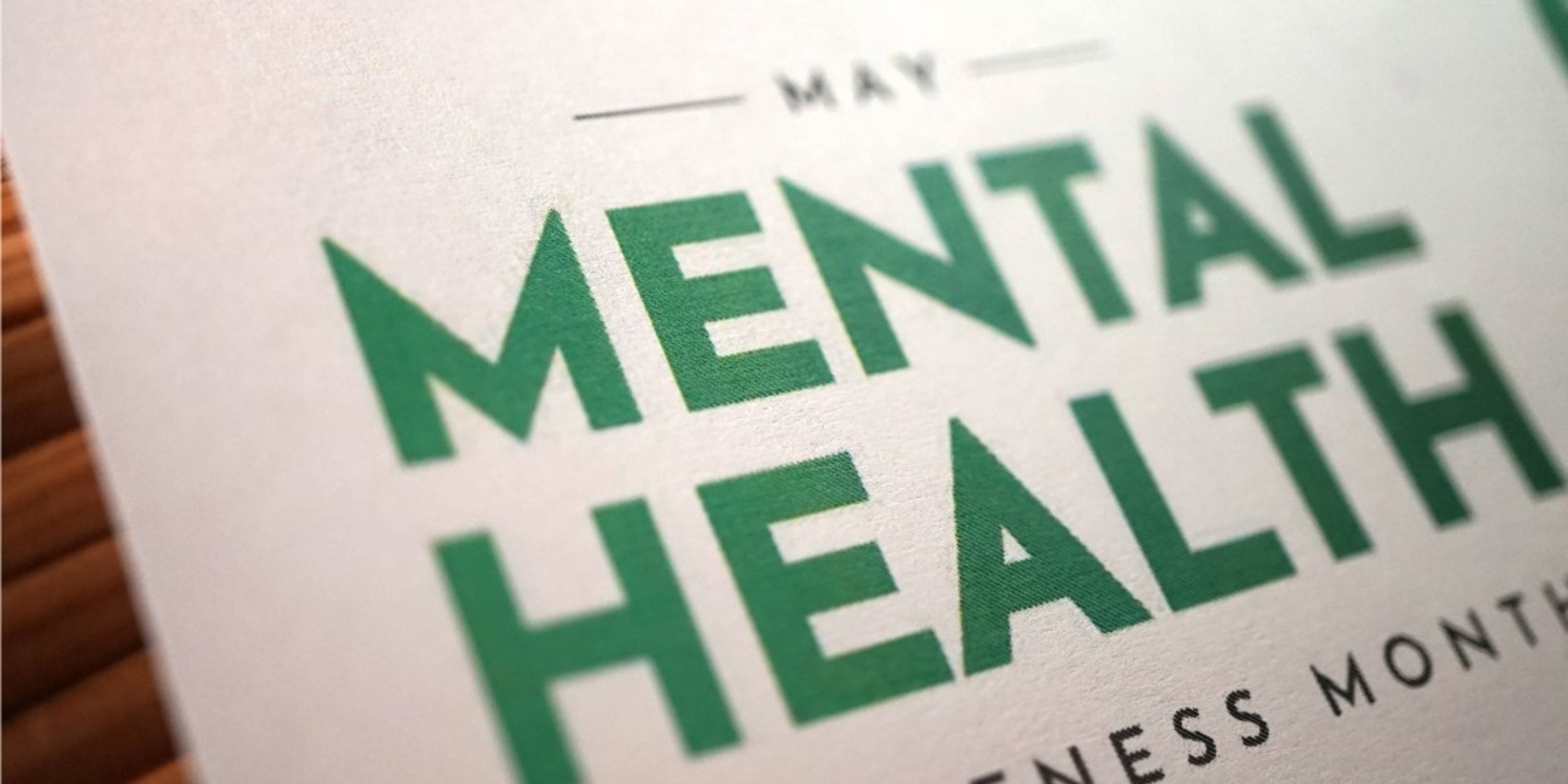May 25, 2023
Are mental health awareness efforts contributing to the rise in reported mental health problems?

Over the past decade, there have been extensive mental health awareness efforts in the western world to improve public understanding about mental health problems. High profile charity campaigns, interventions within schools, universities and workplaces, and numerous personal disclosures from celebrities and public figures have helped to reduce stigma, improve mental health literacy and encourage people to seek help. Despite this, reported rates of mental health problems, including anxiety, depression, eating disorders and self-harm, have increased.
In a recently published paper, our Researcher of the Month, Dr Lucy Foulkes and co-author, Dr Jack Andrews propose that awareness efforts have led to more accurate reporting of symptoms, which is beneficial, but that they have also led some individuals to report milder forms of distress as mental health problems. In Dr Foulkes’s words, these are “problems of living that were not previously considered mental health problems, and still should not be”. The authors hypothesise that because labelling distress as a mental health problem can affect self-concept and behaviour, this then becomes self-fulfilling and leads some people to experience an increase in symptoms. They further argue that this increase in symptoms drives further awareness efforts and the two processes continue to intensify, influencing each other cyclically. They call this the prevalence inflation hypothesis.
Summary
“If people are repeatedly told that mental health problems are common and that they might experience them – and this is especially true for young people who frequently receive mental health information in schools – then it makes sense that they might start to interpret any negative thoughts and feelings through this lens.”
There is some evidence that the rise in the reporting of mental health symptoms follows an existing trend which started several decades ago. The increase in mental health problems has been attributed variously to social media, austerity, income inequality, academic pressure and the Covid-19 pandemic, among other causes. In this paper, Dr Foulkes and Dr Andrews hypothesise about the impact of mental health awareness initiatives as one additional contributory factor.
Improved recognition of mental health problems is hugely beneficial and might lead to more help-seeking and treatment, help reduce rates of deaths from suicide and provide more accurate prevalence rates of mental health problems. Reducing stigma and improving mental health literacy through mental health awareness-raising efforts has given some people the ability to better recognise and report mental health problems that have previously gone under the radar. It is possible that individuals are now seeking help for mental health problems that have always existed, but weren’t recognised or disclosed.
However, Dr Foulkes suggests that caution is needed about the delivery and content of these awareness efforts. Some campaigns emphasise the bravery of disclosing mental health problems. This is an important way to reduce shame and stigma (both barriers to help-seeking), but can also ascribe social value to describing difficulties as mental health problems, perhaps making it more desirable to some people. Mental health problems are now also sometimes glamourised or romanticised on social media.
Other campaigns encourage individuals to notice, label, and seek help for negative psychological experiences, and promote the use of psychiatric terminology. This may lead some people to overinterpret and overpathologise common, mild, transient and normal psychological experiences as mental health problems that require labelling and treating. Research shows that individuals often don’t rely exclusively on a clinician for a diagnosis, but combine clinical opinion with other sources of information, including social media, the internet and newspaper articles, labelling themselves with specific diagnoses. Conflating or confusing psychiatric disorders with the stresses and challenges of normal life is now commonplace. One consequence of our awareness of the vocabulary of mental health without a corresponding depth of understanding, is that terminology can be misused. For example, someone might say that they ‘suffer from anxiety’, when feeling anxious about certain tasks is perfectly normal.
The paper suggests that interpreting and labelling psychological experiences as mental health problems can, in some cases, lead to changes in self-concept and behaviour that bring these symptoms into existence in a self-fulfilling prophecy. This theory is backed up by evidence from several studies which have found that mental health interventions teaching teens and adults about the symptoms of mental health problems, or generalised, preventative psychoeducation interventions teaching cognitive behavioural therapy principles or mindfulness have in some cases led to an increase in internalising or depressive symptoms or people feeling ‘low’ when they didn’t before.
Dr Foulkes further suggests that the relationship between the rise in mental health symptoms and awareness programmes could continually escalate. As prevalence rates increase, awareness efforts increase in response and the pattern continues cyclically, intensifying each time. She calls for this hypothesis to be tested empirically in future studies.
Implications
Implications for parents
Consider how mental health terminology is used within family life. Think carefully about the language you use when describing everyday psychological experiences. If your teen says, “I’m so depressed”, but they are just having an off day or experiencing everyday ups and downs, take the opportunity to explore what they really mean. It’s important to teach our children that some experience of negative emotions and stress is a normal, if unpleasant, part of life. Our goal should not be to eliminate stress and difficulty entirely, but to equip ourselves with helpful coping strategies to manage it. Model coping strategies that work for you and explore strategies that might work for your child. They need to learn that constant happiness is unattainable and experiencing a rainbow of emotions is normal. We need to figure out how to talk about lower, manageable levels of anxiety (about an upcoming presentation at school, for example), without immediately reaching for diagnostic labels.
It’s important to know how to be a good listener and to promote and model active listening as a valued skill. Encouraging people to talk about their problems (as mental health awareness campaigns often do) is only effective if the person they tell knows how to listen. Listen actively, with your whole body. Look at your child, nod and use facial gestures that demonstrate empathy. Ideally, our body language should convey no judgment. If they seem more comfortable talking to you without eye contact (side by side in the car, for example), then stick to this. Try not to interrupt too much, but if there is an appropriate pause, you might sometimes step in and check that you have grasped what they mean. You can do this by repeating what they have said, summarising it and checking you have understood correctly. “Is that accurate?” “Would you say that is a good summary of what you have been telling me?” “Does everything that I have said make sense?” The Samaritans has some excellent tips on active listening.
If your child is exhibiting genuine signs of depression (low mood, irritability and/or not getting pleasure from usually pleasurable activities for at least two weeks), anxiety that is impacting on their day to day life or other worrying symptoms, such as self-harm or disordered eating, it is vital to seek clinical advice.
Implications for schools
Dr Foulkes notes that, “If empirical evidence emerges that mental health awareness efforts can indeed lead to overinterpretation, then there is an urgent need for evidenced-based guidance for how to continue such efforts in various settings (e.g. schools, social media campaigns) while minimising the risk of harm.”
In the meantime, she suggests that we need to move beyond raising awareness that mental health problems exist and towards explaining their complexity, exploring the fact that mental health problems lie on a spectrum, where different issues require different levels and types of support. Some approaches are invaluable for some people, but unhelpful or even actively dangerous for others. Many factors contribute to mental health problems and they often emerge as a response to the context in which someone lives and challenging experiences that they have gone through. Practical initiatives which tackle difficulties (such as bullying or loneliness, for example), rather than simply raising awareness, might help to alleviate or improve distress.
Any Tooled Up subscriber interested in this subject can listen to our interview with Dr Lucy Foulkes and read the accompanying notes.

Dr Lucy Foulkes
Prudence Trust Research Fellow in the Department of Experimental Psychology at the University of Oxford.
Dr Lucy Foulkes’s work focuses on mental health and social development in adolescence. She is particularly interested in whether efforts intended to reduce mental health problems, such as awareness-raising campaigns and school initiatives, may inadvertently increase these problems in some individuals. Her current fellowship focuses on understanding how school-based mental health interventions might lead to unintended harm in some adolescents. In the past, she has also focused on social cognition in adolescents, particularly social risk, social reward and social influence processes, and how these are related to mental health problems. She uses a range of methods in my work, including experimental designs, scale development, longitudinal analysis and systemic review/meta-analysis and is increasingly interested in using qualitative approaches to address questions that quantitative methods cannot reach. Her first book, What Mental Illness Really Is (…and what it isn’t), is out now in paperback and she is currently writing a book about adolescent development, due for publication in late 2024. Her goal is always to ensure that scientific evidence – presented in a straightforward, accessible format – reaches the people who have the power to affect adolescents’ mental health every day.
Dr Lucy Foulkes
Prudence Trust Research Fellow in the Department of Experimental Psychology at the University of Oxford.
Scroll our research gallery

Jul 14, 2025
Do teens with mental health conditions use social media differently than their peers?
As Luisa Fassi, our new Researcher of the Month, comments, "The link between social media use and youth mental health is hotly debated, but hardly any studies look at young people already struggling with clinical-level mental health symptoms". In fact, Luisa's large systematic review and meta-analysis found that only 11% of papers published on the topic since 2007 focused on young people with clinical conditions. Her review also showed that the data used to evidence mental health conditions in these existing studies is not always strong or especially robust. Many report links between social media and mental health on the basis of short self-report questionnaires, where young people are asked about symptoms. Whilst this wasn't found as part of Luisa's review, it is also the case that very few papers in the field differentiate between different mental health conditions, or examine different symptoms or conditions (such as anxiety, ADHD or eating disorders) in isolation. To address this research gap, Luisa and colleagues have recently published a fascinating and nuanced paper. It analyses both quantitative and qualitative dimensions of social media use from a nationally representative survey of 3,340 teens in the UK aged between 11 and 19 years old, which was conducted by NHS Digital in 2017. Rather than gathering mental health data from self-report questionnaires, the young people in the survey underwent a full clinical screening, which included interviews with the young people, their parents and teachers. Information about social media use came from questionnaires completed by participants. They were not asked about specific platforms. Luisa used this data to gather novel insights into how social media and mental health are related in teens who both meet and do not meet diagnostic criteria for a wide range of mental health conditions. The study does not establish any causal links, but it does reveals a range of differences between young people with and without mental health conditions when it comes to social media.

Jun 17, 2025
Navigating the feed: younger adolescents' reflections on algorithmically curated social media
Our latest researcher of the month, Roxana Pomplun, has investigated the interactions, experiences and perceptions of younger adolescents, aged 11, 12, and 13, with algorithmically curated platforms such as TikTok, YouTube Shorts, Spotlight on Snapchat and Reels on Instagram. These kinds of platforms use algorithms to personalise and tailor feeds, harnessing user data to suggest content that the individual is most likely to be interested in and engage with. As such, young people have little control over what they are seeing in their feeds. Tech companies are not yet required to be transparent about the data that they are collecting, but it tends to include demographic information such as age, gender or location, along with use patterns. Whilst these sites dominate the digital lives of tweens and teens, until now they have received little dedicated research attention, particularly in relation to younger users, with most existing studies focusing on older teens. Whilst we know that most social media platforms have age limits of 13, we also know that many younger children are active users, particularly of algorithmically curated platforms like TikTok and YouTube Shorts. Given that early adolescence is a life phase marked by critical neurological development, identity development and heightened susceptibility to mental health issues, deepening our understanding of how younger adolescents engage with social media is vital. Roxana's qualitative research, where a group of young people eloquently explore their own experiences and perceptions, broadens our knowledge of social media use within an age group that appears increasingly aware of the digital influences shaping their online experiences, yet which is still in need of support to fully navigate these ecosystems.

May 15, 2025
Looking beyond smartphone bans
Over the last year or so, there has been a surge in public concern around smartphones and social media. Banning or restricting children’s access to smartphones and social media has grasped the attention of policy makers, schools and parents. A number of countries, including France, Turkey, Norway, Sweden, and regions of the US and Canada have introduced laws, policies or guidance for schools to ‘ban’ or heavily restrict the use of phones. In the UK, there are proposals to raise the age of ‘internet adulthood’ from 13 to 16, and to ban smartphones in schools. The third reading of a private members’ bill on this topic will be heard in parliament in July. Whilst these bans aim to protect children from harm, recent studies highlight a lack of evidence on their efficacy. Along with a team of international experts, our latest Researcher of the Month, Professor Victoria Goodyear, argues that, in isolation, banning smartphone and social media access fails to equip children for healthy use of technology. She suggests that there is a need to shift debates, policies and practices away from a sole focus on restricting smartphone and social media access, toward an emphasis on nurturing children’s digital skills for healthy technology use, and a rights-respecting approach which is underpinned by age-appropriate design and education.

Apr 22, 2025
Encouraging adventurous play in the preschool years
Tune into our podcast interview with April's researchers of the month here. As well as providing numerous opportunities for exploration, joy, and expression, outdoor and adventurous play - the type of play that allows children to take age-appropriate risks - is associated with a range of positive health behaviours and outcomes. Yes, we're talking about the kind of play that might leave us adults with our hearts in our mouths at times, as children start to disappear up a tree, or engage in a rough and tumble game of chase. But its benefits are wide-ranging and known impacts include increased levels of habitual physical activity alongside better mental health and positive mood. In 2019, Dr Hesketh was involved in the creation of physical activity guidelines in the UK, which explicitly note the importance of outdoor play for children in the preschool age group. We know quite a lot about the play habits of school-aged children, but until now, have had significantly less data on their younger counterparts. Our Researchers of the Month, Dr Kathryn Hesketh and Professor Helen Dodd set out to discover how much time preschool-aged children spend playing in a range of indoor and outdoor spaces, and how adventurously they are playing within them. In the first national survey of play in children of this age, they asked over 1000 parents of two to four year olds about their children’s play habits, finding that, on average, children aged two to four spend around four hours per day (outside of educational settings) playing. Just under 50% of this was spent playing outdoors. Their findings shed interesting light on some inequalities in play, even in the youngest age group, which may exacerbate existing inequalities in health.

Mar 17, 2025
Fostering a school culture against bullying: the KiVa Programme
Bullying is an extremely important public mental health risk. Around one in five primary school children report being bullied at least weekly. Children who are bullied are more likely to experience depression and anxiety, and are at heightened risk of mental health issues in adolescence and adulthood. Whilst schools in England and Wales are required to have anti-bullying policies, rates of bullying remain high. Bullying is preventable, but schools need more help to tackle it. Typically, school policies focus on how to handle bullying once it happens. However, evidence suggests that a comprehensive approach involving the entire school to prevent bullying, alongside clear strategies for addressing confirmed cases, is the most effective way to tackle the issue. KiVa is one such whole-school approach, developed in Finland by Professor Christina Samivalli. A large study in Finland which involved 28,000 primary school pupils found that adopting the KiVa programme in Finnish schools significantly reduced bullying and improved children's mental wellbeing. The programme has since been rolled out nationally by the Finnish government and ongoing use of KiVa in Finnish schools is associated with year-on-year incremental reductions in bullying. Along with colleagues, our researcher of the month, Professor Judy Hutchings OBE, has tested the effectiveness of the KiVa Programme in UK primary schools. The study involved over 11,000 children in Wales, Birmingham, Oxfordshire and Devon, and showed a 13% reduction in reported rates of bullying when compared with existing school approaches to tackle bullying.

Feb 12, 2025
When is the right age? Searching for age-appropriate ways to support children's online lives
Currently, children's and young people’s use of digital technology is rarely out of the news. Age limits are debated. Calls for stronger limits are made, and questions are raised regarding whether society should ban 'under-age' children from various aspects of the digital world. 13 years of age is often cited as a digital 'age of consent', though this varies in some countries. Commonly used age limits are largely arbitrary, based primarily on US legislation, rather than evidence. In a recent paper, our researcher of the month, Dr Kim Sylwander, and her co-author Professor Sonia Livingstone, consider age milestones and evaluate whether or not the evidence supports them. Are age limits the optimal way to regulate children’s digital experiences? Does it matter that they are widely contested and often poorly implemented? And are common boundaries even the “right” age, according to evidence from the field of children and digital media? Dr Sylwander persuasively argues that moving forward, a developmental approach can better support children’s rights.

Jan 14, 2025
Showing faith and trust in children nurtures integrity
A new study which explores the development of trust and integrity in children has found that expressing trust in young children encourages them to behave honesty. The research team, including our researcher of the month, Professor Li Zhao, studied whether children were less likely to cheat in a simple test of counting accuracy if the adult administering the test had previously conveyed trust in them. They found that children who were trusted cheated less than those who were not trusted. These findings provide novel evidence about the causal effect of trust on the development of children's honesty.

Dec 17, 2024
Intrinsic reward and word learning
From infancy onwards, humans display an innate motivation to acquire language and to communicate. We start acquiring words as babies and continue to do so throughout our lives. In fact, children are thought to learn over 3000 new words each year. However, relatively little work has focused on why we are motivated to learn words, particularly when it comes to adolescents. Adolescence is a period of great neurological change and sensitivity to learning. It's also marked by changes in reading behaviours. Whilst children become skilled readers between the ages of 10 and 18, this period is also associated with motivational changes in reading, with teens frequently showing a disinclination to read for pleasure. This change often coincides with the transition from primary to secondary school. Policy makers are keen to motivate adolescents to read for pleasure, arguing that it would improve not just literacy outcomes, but also result in substantial economic and societal benefit. Recent research has shown that adults find learning words to be intrinsically rewarding, and that this intrinsic reward facilitates the entrance of new words into long-term memory. In their latest paper, our researchers of the month, Professor Saloni Krishnan and Professor Pablo Ripollés, set out to establish whether the same is true for children and teens.

Nov 14, 2024
Delivering effective menstrual education
Research has shown that menstruation and menstrual cycle symptoms can be disruptive and detrimental to physical, mental and social wellbeing. As many as 93% of teen girls experience dysmenorrhea (severe cramps) and girls with a typical cycle experience 11 menstrual cycle-related symptoms on average, potentially including mood changes, stomach cramps and increased levels of anxiety and fatigue. Adolescents with problematic symptoms have reported a negative impact on school attendance, behaviour, confidence around peers and participation in physical activity. In the United Kingdom, evidence suggests that menstrual health education delivered by teachers generally focuses on menstrual cycle biology, as opposed to management of menstruation and menstrual cycle related symptoms. Our latest researcher of the month, Dr Natalie Brown, set out to understand young people’s perceptions of menstrual education in schools and their experiences of menstruating whilst at school, including within physical education. Her study involved nine focus groups with 10-15 year old female pupils attending primary and secondary schools across England and Wales. Pupils highlighted that, in their experience, menstrual education is limited and noted that the menstrual cycle impacts negatively on their school experience, affecting participation in sport and school attendance generally. Participants highlighted a need for more support and information regarding understanding and managing periods in school.

Oct 17, 2024
How influential is social media on young people's mental health?
A significant body of evidence tells us that young people's mental health has decreased over time, and a potential link between social media use and this mental health decline has triggered wide interest and concern. Research into social media use and mental health is being conducted at a rapid pace but, so far, findings are far from conclusive. Our new Researcher of the Month, Dr Margarita Panayiotou, adds to this body of work. She led a team of researchers who recently published a study involving thousands of young people in the UK. It set out to explore the interplay between social media use and teens' mental health, wellbeing and social life, and found that when considering the complex combination of multiple factors, things such as a lack of family support are arguably more important for adolescent mental health than social media use.

